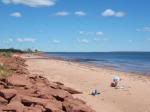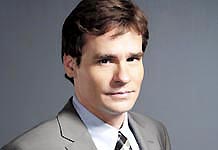Black Skies by Arnaldur Indridason, 430 pages
RIP 7; series goals
Indridason's Icelandic series, now up to book eight translated into English, have mostly been about Detective Erlendur, the solitary melencholy man inordinately interested in missing people. The last book, Outrage (my review), had Erlendur gone on a hiking trip to the eastern fjords, and thus starred Elinborg as she investigated a crime. We got to learn more about her and her family. In this latest book to be translated, Erlendur is still missing and his daughter is beginning to wonder where he might be. Instead of Elinborg, Sigurdur Oli gets to take the lead in Black Skies.
I liked Elinborg a little more than Sigurdur as he is crankier. His wife has left him, and we get to see his dealings with his parents in this book. The main mystery is relates to the monetary boom and bust that occurred in Europe, including Iceland. Sigurdur is asked by his sister-in-law to look into a case of blackmail, and ends up at the scene of a murder. Another case, left over from the last book with Erlendur, draws Sigurdur in, and we get to see how dedicated he can be to his profession.
Although we have been getting these books once a year, in book time, it appears that Erlendur has only been gone a week or two, and these two cases with Elinborg and Sigurdur have taken place simultaneously or at the very least, close together. People are beginning to wonder where Erlendur has gone, and hopefully, the next book will have his two colleagues on the case of the missing Erlendur. To truly enjoy the development of the characters, these books should be read in order, although the last two books could easily be read as stand-alones. Love these mysteries!
Thursday, October 11, 2012
Wednesday, October 10, 2012
BOOK: The Film Club by David Gilmour
The Film Club, by David Gilmour, 242 pages
Canadian Book Challenge
My real life book club picked this for its September read. We are just getting started with our book club and are using our local library, so are limited by what books they have available for book clubs. (Do any other libraries do this? If I search the online catalogue for 'book club kits', there are several hundred sets of books, that come with discussion questions if you like, available to borrow for six weeks, with 10 books or so for everyone. Very cool.) We've only been meeting for a few months and this was our first non-fiction book.
David Gilmour is a Canadian CBC personality. I've seen him on The National and other shows; usually he's an Arts commentator, maybe reviewing a movie or a book. The Film Club is his recounting of the years he had a Film Club with his teenage son. It's actually a little more than that - his troubled fifteen year old son was not enjoying school at all, so Gilmour lets him drop out of school and he agreed to home school him, but just by watching and discussing a couple of movies a week, Dad's choice. [This prompted the biggest discussion, naturally. Really? We were a tad judgmental at this point.] The only rule he put on his son was no drugs, but Gilmour didn't seem to consider cigarettes or alcohol a drug, even for a fifteen year old. [More questionable judgments by us/me.]
While I don't think it is possible to read this without questioning the decisions that were made by the dad, it was still very readable, and we all liked it, regardless of what we thought of the choices. We all wished there was more discussions about the actual movies, as Gilmour knows a lot about movies. [Nice index at the back of all movies watched.] Much of the book also traced the son's romantic travails, and I wasn't completely impressed with Gilmour's view of women in general. He related all his son's problems to women problems in his own life. Gilmour lives an unconventional life compared to all of us in our book club, and this difference is what makes the book a learning experience. [For one example, taking a trip to Cuba with his son and his ex-wife, mom of the son, with only the promise of a money for a potential job in the future. Which of course fell through.] General concensus was more movies, less romantic issues.
The Film Club is a well-written, engaging book, that can definitely prompt much discussion about teenagers, child-raising, and different lifestyles. Plus, you will end up with a list of movies you will want to watch.
Canadian Book Challenge
My real life book club picked this for its September read. We are just getting started with our book club and are using our local library, so are limited by what books they have available for book clubs. (Do any other libraries do this? If I search the online catalogue for 'book club kits', there are several hundred sets of books, that come with discussion questions if you like, available to borrow for six weeks, with 10 books or so for everyone. Very cool.) We've only been meeting for a few months and this was our first non-fiction book.
David Gilmour is a Canadian CBC personality. I've seen him on The National and other shows; usually he's an Arts commentator, maybe reviewing a movie or a book. The Film Club is his recounting of the years he had a Film Club with his teenage son. It's actually a little more than that - his troubled fifteen year old son was not enjoying school at all, so Gilmour lets him drop out of school and he agreed to home school him, but just by watching and discussing a couple of movies a week, Dad's choice. [This prompted the biggest discussion, naturally. Really? We were a tad judgmental at this point.] The only rule he put on his son was no drugs, but Gilmour didn't seem to consider cigarettes or alcohol a drug, even for a fifteen year old. [More questionable judgments by us/me.]
While I don't think it is possible to read this without questioning the decisions that were made by the dad, it was still very readable, and we all liked it, regardless of what we thought of the choices. We all wished there was more discussions about the actual movies, as Gilmour knows a lot about movies. [Nice index at the back of all movies watched.] Much of the book also traced the son's romantic travails, and I wasn't completely impressed with Gilmour's view of women in general. He related all his son's problems to women problems in his own life. Gilmour lives an unconventional life compared to all of us in our book club, and this difference is what makes the book a learning experience. [For one example, taking a trip to Cuba with his son and his ex-wife, mom of the son, with only the promise of a money for a potential job in the future. Which of course fell through.] General concensus was more movies, less romantic issues.
The Film Club is a well-written, engaging book, that can definitely prompt much discussion about teenagers, child-raising, and different lifestyles. Plus, you will end up with a list of movies you will want to watch.
Tuesday, October 9, 2012
BOOK: The Calling by Inger Ash Wolfe
The Calling by Inger Ash Wolfe, 419 pages
Canadian Book Challenge; RIP 7
You have to like a crime novel whose main character is a 61 year old divorced woman, heading up the local police station in small town Ontario. The Calling was released in 2008, with the understanding that Inger Ash Wolfe was a pseudonym of a famous 'literary' Canadian author. In July of this year, after writing The Taken and the recently released A Door in the River, Michael Redhill revealed that he has been writing the Hazel Micallef series.
Hazel is a wonderfully complex character dealing with many changes in her life (divorce after thirty-four years of marriage, living with her mother, bad back, drinking problem) as well as the politics of policing. Her small town deals with the usual type of crime, so when an elderly woman is found murdered, Hazel is faced with a crime she hasn't had to investigate often. It appears to be an assisted suicide. The crime scenes are vividly described and quite graphic, and as more crimes are discovered, it gets worse and worse. Alternately, the reader gets chapters about the serial killer, and his progress across Canada. A truly Canadian novel - coast to coast! The serial killer is one sick puppy.
A good crime series for me has characters in the police department I like and want to know more about. Here we have Hazel, as well as a couple of young cops, Wingate and Sevigny, that I am anxious to read more about. How will Wingate and Sevigny become a team with Hazel? All of them are quick to go their own way and step outside of accepted practice. Can they learn to work together and how much trouble are they all in after their methods in solving this crime?
also reviewed: Gavin at page 247;
Canadian Book Challenge; RIP 7
You have to like a crime novel whose main character is a 61 year old divorced woman, heading up the local police station in small town Ontario. The Calling was released in 2008, with the understanding that Inger Ash Wolfe was a pseudonym of a famous 'literary' Canadian author. In July of this year, after writing The Taken and the recently released A Door in the River, Michael Redhill revealed that he has been writing the Hazel Micallef series.
Hazel is a wonderfully complex character dealing with many changes in her life (divorce after thirty-four years of marriage, living with her mother, bad back, drinking problem) as well as the politics of policing. Her small town deals with the usual type of crime, so when an elderly woman is found murdered, Hazel is faced with a crime she hasn't had to investigate often. It appears to be an assisted suicide. The crime scenes are vividly described and quite graphic, and as more crimes are discovered, it gets worse and worse. Alternately, the reader gets chapters about the serial killer, and his progress across Canada. A truly Canadian novel - coast to coast! The serial killer is one sick puppy.
A good crime series for me has characters in the police department I like and want to know more about. Here we have Hazel, as well as a couple of young cops, Wingate and Sevigny, that I am anxious to read more about. How will Wingate and Sevigny become a team with Hazel? All of them are quick to go their own way and step outside of accepted practice. Can they learn to work together and how much trouble are they all in after their methods in solving this crime?
also reviewed: Gavin at page 247;
Monday, October 8, 2012
BOOK: Touch by Alexi Zentner
Touch by Alexi Zentner, 264 pages
Canadian Book Challenge 6; Giller Prize Longlist 2011
There was a lot of potential in this book, but it wasn't the right book for me. It's one of those books that I liked, but didn't; I remember parts of it vividly, but didn't understand the overall theme in the book; I'm not a fan of magical realism, but sometimes it works for me - this time it mostly did. As you can see, I'm quite conflicted about it.
It is an historical story set in a small logging village in British Columbia. The story is ultimately about a minister who returns to the place he grew up. His story is also the story of his father and grandfather, the grandfather who founded the village. It's the classic 'man looks back on his life and what made him the man he is today' tale. I actually had a hard time keeping the characters organized in my head, which is strange because there weren't that many of them, but the flips in time and generation was challenging. The view of life in isolated northern Canada, and the snow! was a part I did like, as well as how the mythology of the area developed. Also, how some people could benefit from the gold rush without mining any gold. There were some gruesome (cannibalism?) parts, and while I liked the magical stuff, it almost veered too far.
I read this back in August and it did transported me to a different time and place so it certainly set its atmosphere and location well. Ultimately, I didn't love it but I has read many rave reviews (see below) and I can appreciate why it gets the raves. Sometimes those books are hit or miss for me.
also reviewed: beachreader; terri B at tip of the iceberg; eva at a striped armchair; buried in print; jules at jules' book reviews;
Canadian Book Challenge 6; Giller Prize Longlist 2011
There was a lot of potential in this book, but it wasn't the right book for me. It's one of those books that I liked, but didn't; I remember parts of it vividly, but didn't understand the overall theme in the book; I'm not a fan of magical realism, but sometimes it works for me - this time it mostly did. As you can see, I'm quite conflicted about it.
It is an historical story set in a small logging village in British Columbia. The story is ultimately about a minister who returns to the place he grew up. His story is also the story of his father and grandfather, the grandfather who founded the village. It's the classic 'man looks back on his life and what made him the man he is today' tale. I actually had a hard time keeping the characters organized in my head, which is strange because there weren't that many of them, but the flips in time and generation was challenging. The view of life in isolated northern Canada, and the snow! was a part I did like, as well as how the mythology of the area developed. Also, how some people could benefit from the gold rush without mining any gold. There were some gruesome (cannibalism?) parts, and while I liked the magical stuff, it almost veered too far.
I read this back in August and it did transported me to a different time and place so it certainly set its atmosphere and location well. Ultimately, I didn't love it but I has read many rave reviews (see below) and I can appreciate why it gets the raves. Sometimes those books are hit or miss for me.
also reviewed: beachreader; terri B at tip of the iceberg; eva at a striped armchair; buried in print; jules at jules' book reviews;
Subscribe to:
Comments (Atom)





